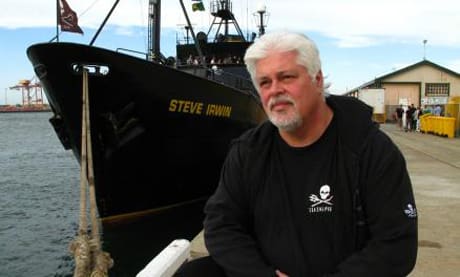"If anyone thinks they're going to change the world by appealing to the morality of human beings, they aren't going to get very far. Human beings are not moral," says Paul Watson, the subject of Eco-Pirate and founder of the Sea Shepherd Conservation Society, which promotes, and engages in, direct action as a means of deterrent and law enforcement in issues of marine conservation.
Preferring animals to people, he uses aggressive tactics to save the whales (ramming whaling ships, engaging in chases, sabotaging vessels, etc.) rather than protests and passivity, something he equates with ineffectual pleading and lackadaisical posturing.
Trish Dolman's documentary details these justifications and his surprisingly sagacious cynicism quite candidly, also providing a timeline of Watson's career and activist mission statement while sharing interviews with various family members, colleagues and specialists in the field, giving a variety of perspectives on a controversial figure.
Progressively revealing factoids about the Canadian animal rights activist, such as his rift with Greenpeace in the '70s, when his less-than-passive tactics didn't gel with their blanket non-violent ideologue, Eco-Pirate works best when doling out exposition and sharing insights on marine life and whale intelligence. Some interesting notions come up along the way, like the necessity of the media to further a cause and the assertion that Watson is a single-minded egomaniac, but never find their place in the cohesive whole.
Despite having an abundance of onsite footage and extremely personal interviews, this dissection of a Canadian figurehead never finds its flow or footing. Interjections, such as Watson's callous disregard for family and spousal obligations, pop into the film unannounced, having no context with the organic narrative focus, then disappear without further mention.
Because the documentary moves in a linear fashion more so than a thematic one, the gradual building of character through astute editing and intentional juxtaposition is almost entirely absent. Since there is little focus or lasting impression, we're left floundering with a substantial amount of interesting, but partially disconnected, information.
It's a shame, since somewhere in here is an amazing film desperate to get out and examine not only animal activism, but also the psychology of solipsism and success.
(eOne)Preferring animals to people, he uses aggressive tactics to save the whales (ramming whaling ships, engaging in chases, sabotaging vessels, etc.) rather than protests and passivity, something he equates with ineffectual pleading and lackadaisical posturing.
Trish Dolman's documentary details these justifications and his surprisingly sagacious cynicism quite candidly, also providing a timeline of Watson's career and activist mission statement while sharing interviews with various family members, colleagues and specialists in the field, giving a variety of perspectives on a controversial figure.
Progressively revealing factoids about the Canadian animal rights activist, such as his rift with Greenpeace in the '70s, when his less-than-passive tactics didn't gel with their blanket non-violent ideologue, Eco-Pirate works best when doling out exposition and sharing insights on marine life and whale intelligence. Some interesting notions come up along the way, like the necessity of the media to further a cause and the assertion that Watson is a single-minded egomaniac, but never find their place in the cohesive whole.
Despite having an abundance of onsite footage and extremely personal interviews, this dissection of a Canadian figurehead never finds its flow or footing. Interjections, such as Watson's callous disregard for family and spousal obligations, pop into the film unannounced, having no context with the organic narrative focus, then disappear without further mention.
Because the documentary moves in a linear fashion more so than a thematic one, the gradual building of character through astute editing and intentional juxtaposition is almost entirely absent. Since there is little focus or lasting impression, we're left floundering with a substantial amount of interesting, but partially disconnected, information.
It's a shame, since somewhere in here is an amazing film desperate to get out and examine not only animal activism, but also the psychology of solipsism and success.




